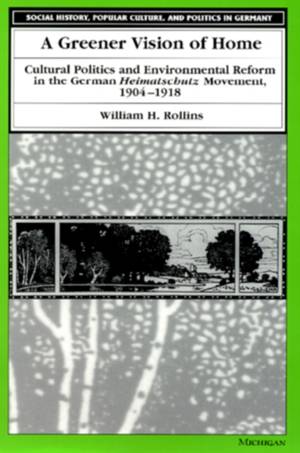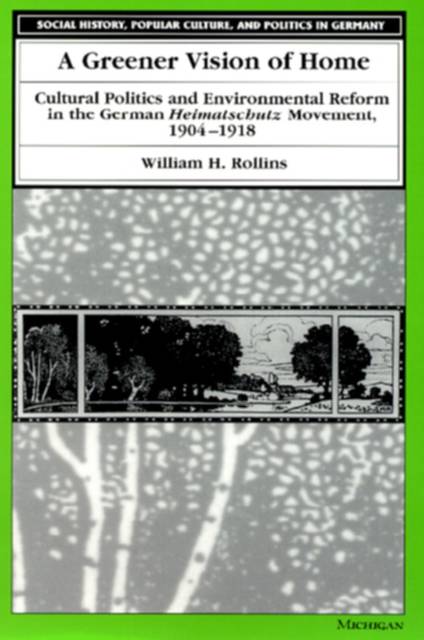
- Afhalen na 1 uur in een winkel met voorraad
- Gratis thuislevering in België vanaf € 30
- Ruim aanbod met 7 miljoen producten
- Afhalen na 1 uur in een winkel met voorraad
- Gratis thuislevering in België vanaf € 30
- Ruim aanbod met 7 miljoen producten
Zoeken
A Greener Vision of Home
Cultural Politics and Environmental Reform in the German Heimatschutz Movement, 1904-1918
William H Rollins
€ 135,95
+ 271 punten
Omschrijving
Suburban sprawl, advertising clutter, vast industrial plantations of spindly pines punctuated by stone-lined gutters in place of streams--this was the thoroughly modern landscape of Germany by the turn of the century. Most people ignored the devastating changes in their environment, or quickly rationalized them away as the price that had to be paid for "progress." But in 1904, three-quarters of a century before Greenpeace, one group arose that did not compromise on conservation: the movement for "homeland-protection," or Heimatschutz.
Aesthetic or "romantic" ideas about the environment have often expressed valuable critiques of our all-too-utilitarian modern lifestyle. In the English-speaking world
John Ruskin and William Morris are well known for this kind of ecological antimodernism; a very similar aesthetic concern for landscape energized the Heimatschutz movement. Drawing on a wide range of archival and printed sources, many made accessible here for the first time, William H. Rollins shows that this was a broad-based middle-class reform movement that combined social egalitarianism with protection for the entire working landscape.
A Greener Vision of Home will appeal to readers in German studies and cultural studies and others interested in some of the roots and major strategies of today's highly visible environmental movement.
William H. Rollins is Lecturer in the Department of German, University of Canterbury, Christchurch, New Zealand.
Aesthetic or "romantic" ideas about the environment have often expressed valuable critiques of our all-too-utilitarian modern lifestyle. In the English-speaking world
John Ruskin and William Morris are well known for this kind of ecological antimodernism; a very similar aesthetic concern for landscape energized the Heimatschutz movement. Drawing on a wide range of archival and printed sources, many made accessible here for the first time, William H. Rollins shows that this was a broad-based middle-class reform movement that combined social egalitarianism with protection for the entire working landscape.
A Greener Vision of Home will appeal to readers in German studies and cultural studies and others interested in some of the roots and major strategies of today's highly visible environmental movement.
William H. Rollins is Lecturer in the Department of German, University of Canterbury, Christchurch, New Zealand.
Specificaties
Betrokkenen
- Auteur(s):
- Uitgeverij:
Inhoud
- Aantal bladzijden:
- 344
- Taal:
- Engels
- Reeks:
Eigenschappen
- Productcode (EAN):
- 9780472108091
- Verschijningsdatum:
- 26/09/1997
- Uitvoering:
- Hardcover
- Formaat:
- Genaaid
- Afmetingen:
- 161 mm x 237 mm
- Gewicht:
- 657 g

Alleen bij Standaard Boekhandel
+ 271 punten op je klantenkaart van Standaard Boekhandel
Beoordelingen
We publiceren alleen reviews die voldoen aan de voorwaarden voor reviews. Bekijk onze voorwaarden voor reviews.







